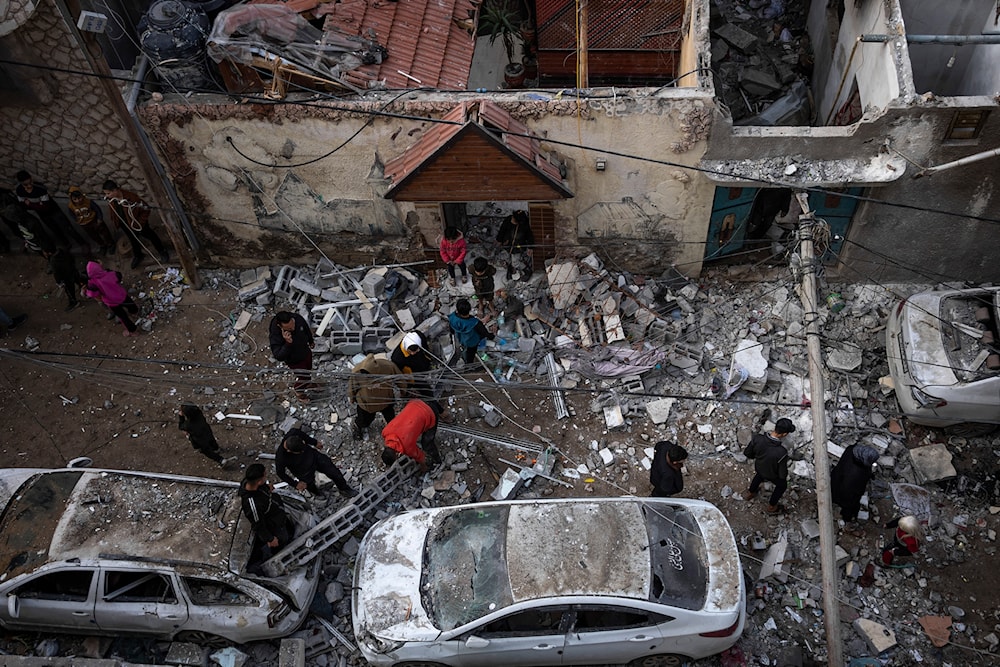Israeli tourism industry dealt a mighty blow by aggression on Gaza
The director general of the Chamber of Inbound Tourism Organizers described "Israel" as being completely isolated from the world regarding aviation.
-

Palestinians look at the destruction after an Israeli strike in Rafah, Gaza, on February 9. (AP)
According to a trade group representing major receptive tour operator businesses and suppliers, "Israel's" tourist sector is in critical trouble as a result of the ongoing war on Gaza, and many airlines are hesitant to travel to the occupied territories.
“Before the crisis, there were 250 airline companies operating in Israel, and now only 45 companies are operating,” said the director general of the Chamber of Inbound Tourism Organizers, Yossi Fattal.
Fattal told the Israeli newspaper Maariv that "Israel" was completely being isolated from the world in regards to aviation, reporting that 80% of flights are being operated by the Israeli El Al.
He noted that the war on Gaza was harming "Israel's strategic image," detailing that the government should have found a way to bring tourists to "Israel" despite the ongoing war.
“Jordan and Egypt, which are also affected, finance the airlines that bring tourists to them. Today, Israel does not fund insurance for foreign airlines, only Israeli ones," detailing that premiums to travel to the occupation are "enormous."
Fattal also stated that it will take "two or three years" to rebuild "Israel's" reputation and allow airlines to resume operations when the war ends.
Tourism provides for over 3% of the occupation's GDP and directly employs approximately 200,000 people, according to the tourism ministry.
Last month, the Israeli Phoenix Gamma index showed that the Israeli tourism sector has suffered greatly following the Palestinian Resistance Operation Al-Aqsa Flood on October 7.
Analyzing the shopping cycle, transaction numbers, and weekly average purchase amounts, the latest figures for the last quarter of 2023 paint a grim picture for one of the Israeli occupation's vital sectors.
The tourism sector witnessed a staggering 73% decrease in turnover compared to the end of 2022. Transactions plummeted by 64%, accompanied by a 26% drop in the average transaction amount.
Restaurants, cafes, and fast-food establishments faced a 16% dip in turnover, with transactions dropping by 1.5% year-on-year. The initial two weeks of the war on Gaza saw near-zero activity, which may be linked to large barrages of rockets launched from the Gaza Strip toward occupation cities on a daily basis. Due to such circumstances, Israeli settlers opted to remain indoors resulting in a nearly 40% decrease in turnovers and transactions for restaurants.
How war on Gaza dealt ‘Israel’ mighty economic blow: Axios
"Israel's" funding of the war on Gaza has resulted in its first-ever credit downgrade.
Given the expense of the war, "Israel" will need to borrow almost $58 billion this year, according to Bloomberg, which equates to nearly $23,000 per household, and 3 times the amount of the fiscal deficit in 2022.
Moody's cut "Israel's" credit rating one notch, from A1 to A2, and noted the entity's poor finances, as well as the ongoing war on Gaza's potential to "weaken its executive and legislative institutions."
In mid-February Moody's took further action and downgraded the deposit ratings of five Israeli banks, from A2 to A3, designating the outlook on long-term deposit ratings as negative.
The US credit ratings agency lowered the long- and short-term deposit ratings of "Bank Leumi Le-Israel, Bank Hapoalim, Mizrahi Tefahot Bank Ltd., Israel Discount Bank Ltd., and First International Bank of Israel Ltd. (FIBI)," by one notch to A3 from A2.
Moody’s said the downgrade is “driven by a lower government support uplift incorporated in those ratings because of the downgrade of Israel’s sovereign ratings.”

 4 Min Read
4 Min Read








